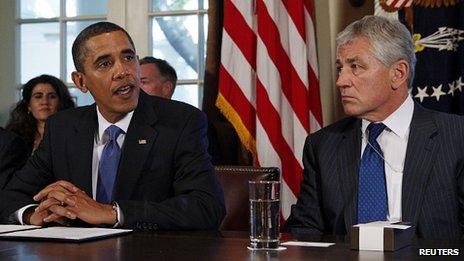Iran once again at centre of US divide
- Published

Some pro-Israeli groups urged Mr Obama not to nominate Chuck Hagel
Decision-makers in Iran have often been ridiculed for thinking that they occupy the centre of the universe. All of Washington's calculations evolve around them, the clergy in Iran seem to believe.
But for once, they may be right.
With the fights over President Barack Obama's likely nomination of Senator Chuck Hagel as defence secretary and the pressure from Israeli Prime Minister Benjamin Netanyahu over nuclear red lines, the fault lines in US Middle East policy clearly centre on Iran.
Pro-Israeli groups and neo-conservative centres have launched a massive and somewhat unprecedented campaign to prevent Mr Hagel from getting the top job at the Pentagon, accusing the former Nebraska senator of being anti-Semitic, anti-Israeli and soft on Iran.
Bill Kristol, prominent neo-conservative pundit and editor of the The Weekly Standard, rails against Mr Hagel for his position on US-Iran relations. He also charges that Mr Hagel "has a record of consistent hostility to Israel over the last decade".
The Emergency Committee for Israel quickly produced a video urging Mr Obama not to nominate the Nebraska lawmaker, arguing that Mr Hagel's scepticism about sanctions and caution about using military force against Iran make him "not a responsible option".
But while Mr Hagel has many detractors among the neo-conservatives, he does not lack supporters in other political circles, including more centrist pro-Israeli groups such as J Street and the Israel Policy Forum.
Strong support
On Thursday, a group of prominent former diplomats published a letter strongly supporting him.
"We support, most strongly and without qualification, President Obama's reported intention to nominate Senator Chuck Hagel to be the next secretary of defense," they write in the open letter.
The signatories include former Undersecretaries of State Tom Pickering and Nick Burns, Ambassadors Ryan Crocker, Daniel Kurtzer and Frank Wisner.
Many of the signers of the Hagel letter also appeared in another open letter to Mr Obama - this one on Iran - published that same day, further bringing to light Tehran's centrality in these debates.
That letter urges Mr Obama to adopt a bolder diplomatic approach with greater emphasis on positive incentives rather than additional sanctions.
They write: "As a first step, we urge you and your team to pursue a revised proposal calling for a verifiable halt to Iran's accumulation of 20%-enriched uranium including export of the material or conversion to metallic form in Iran in exchange for a reciprocal relaxing some of international and financial sanctions imposed on Iran."
The letter was organised by two advocacy groups in Washington, the National Iranian American Council and the Arms Control Association, and signed by 24 American generals, former diplomats and experts.
As Mr Obama prepares for a new round of negotiations with Iran, the stakes could not be any higher. If Mr Hagel becomes the next secretary of defence, strategists on all sides believe that opposition to war will be significantly strengthened.
Rarely has the nomination for a defence secretary literally become an issue of war and peace.